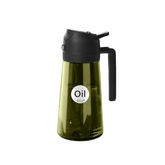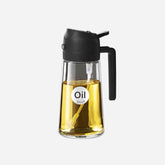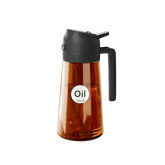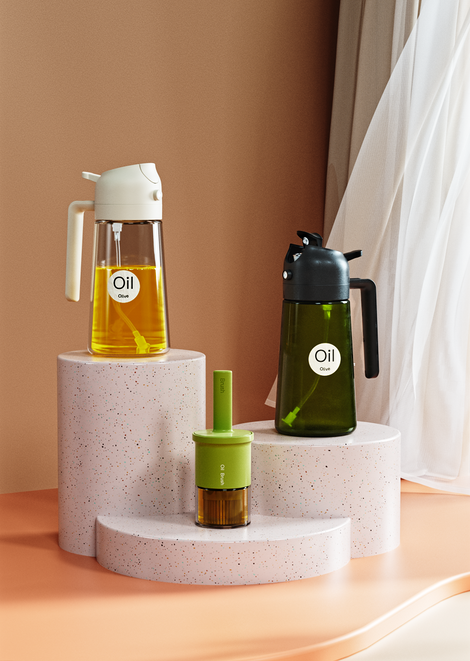5 Eco-Clean Hacks to Prevent Oil Sprayer Fouling in 2025
Oil sprayers make cooking healthier and DIY projects smoother—until clogged nozzles and sticky residue turn them into a headache. Fouling isn’t just inconvenient; it wastes oil, breeds bacteria, and forces you to buy replacements. But here’s the good news: Eco-clean methods (think natural, sustainable fixes) can keep your sprayers working like new. No fancy products needed—just smart habits and the right tools. Let’s break down five practical, planet-friendly tips to banish clogs for good.

1. How Often Should You Clean Your Oil Sprayer to Stop Buildup?
Clogs creep up when you least expect them. For light users, a biweekly rinse with warm water works. But if you’re using thicker oils (like coconut or sesame) or cooking daily, clean your sprayer every 3-4 days. Why? Oils oxidize quickly, leaving behind gunk that hardens like glue.
Eco-clean tip: Mix 1 tsp baking soda with ½ cup white vinegar in a glass oil spray bottle. Shake well, spray into the nozzle, and let it fizz for 5 minutes. Rinse thoroughly—no scrubbing needed! For stubborn residue, soak removable parts in hot soapy water (use castile soap for eco-friendly cleaning). Dry with a microfiber cloth to avoid lint.
2. Why Does Your Oil Storage Method Matter? Light Is the Enemy
Storing oil in a clear plastic bottle by the stove? You’re inviting fouling. Light and heat degrade oils, speeding up oxidation and sludge formation. Instead, transfer oils to a dark glass oil spray bottle—it blocks UV rays and keeps oils fresh longer.
Eco-clean hack: Label bottles with dates to track freshness. Oils last 1-2 months in glass vs. weeks in plastic. For rarely used oils (like avocado or walnut), store them in the fridge. Pro tip: Use a dark oil spray bottle with a stainless steel nozzle—it resists rust and won’t leach chemicals into your oils.
3. Can a 10-Second Post-Use Ritual Prevent 90% of Clogs?
Absolutely. After spraying, rinse the nozzle under warm water for 10 seconds. This flushes out lingering oil before it dries and hardens. No sink nearby? Keep a small healthy oil sprayer filled with water and spritz the nozzle into a rag.
For deeper care: Once a week, disassemble the sprayer and soak parts in a vinegar-water solution (1:3 ratio). Scrub with an old toothbrush—bamboo brushes are eco-friendly! Dry completely to prevent mold. Bonus: Store your sprayer upside down to let residual oil drain back into the bottle.
4. Are You Using the Right Oils for Sprayers?
Thick, unrefined oils like extra-virgin olive oil or cold-pressed sesame are clog magnets. Their sediment and low smoke points create residue fast. Opt for refined oils (light olive, avocado, or grapeseed)—they’re filtered and less likely to gunk up your refillable oil spray bottle.
Love unfiltered oils? Strain them through cheesecloth into a glass oil spray bottle before using. Add a pinch of citric acid to the bottle—it slows oxidation naturally. Avoid plastic containers, as they can react with oils and accelerate spoilage.
5. What’s the Ultimate Eco-Clean Fix for Stubborn Clogs?
When your sprayer sputters like a leaky faucet, it’s time for the “power soak.” Disassemble the sprayer and boil parts in water with 1 tbsp baking soda for 10 minutes. The heat softens hardened oil, while baking soda lifts residue.
For plastic parts: Skip boiling (they can warp). Instead, soak in a mix of lemon juice and salt overnight. Scrub gently, rinse, and air-dry. Prevent future clogs by using a healthy oil sprayer with wide nozzle holes—they’re less likely to trap particles.
Keep Your Sprayer Clean—Naturally
Oil sprayer fouling doesn’t have to mean tossing plastic bottles or relying on harsh chemicals. With eco-clean habits like quick rinses, smart storage, and choosing the right tools (glass oil spray bottles and stainless steel sprayers), you’ll save money, reduce waste, and keep your kitchen routines running smoothly. In 2025, let sustainability and simplicity be your secret weapons. Now go drizzle that pesto like a pro!














